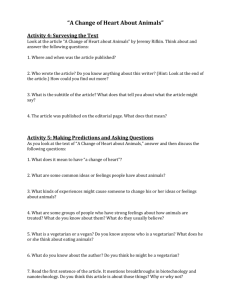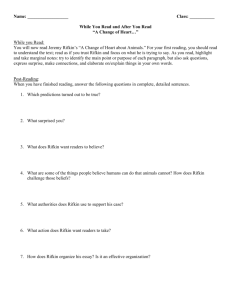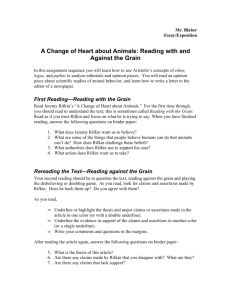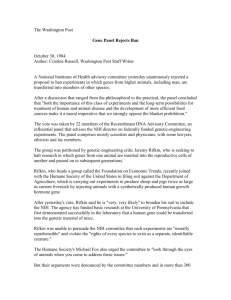The Rhetoric of the Op-Ed Page: Ethos, Logos, and Pathos
advertisement
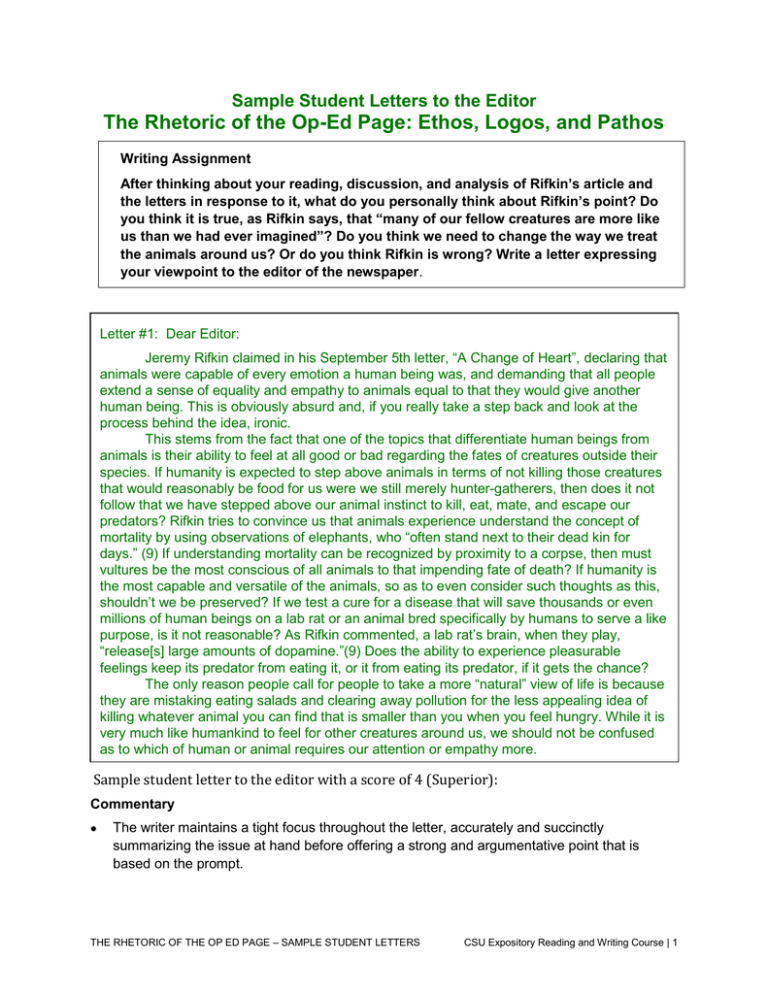
Sample Student Letters to the Editor The Rhetoric of the Op-Ed Page: Ethos, Logos, and Pathos Writing Assignment After thinking about your reading, discussion, and analysis of Rifkin’s article and the letters in response to it, what do you personally think about Rifkin’s point? Do you think it is true, as Rifkin says, that “many of our fellow creatures are more like us than we had ever imagined”? Do you think we need to change the way we treat the animals around us? Or do you think Rifkin is wrong? Write a letter expressing your viewpoint to the editor of the newspaper. Letter #1: Dear Editor: Jeremy Rifkin claimed in his September 5th letter, “A Change of Heart”, declaring that animals were capable of every emotion a human being was, and demanding that all people extend a sense of equality and empathy to animals equal to that they would give another human being. This is obviously absurd and, if you really take a step back and look at the process behind the idea, ironic. This stems from the fact that one of the topics that differentiate human beings from animals is their ability to feel at all good or bad regarding the fates of creatures outside their species. If humanity is expected to step above animals in terms of not killing those creatures that would reasonably be food for us were we still merely hunter-gatherers, then does it not follow that we have stepped above our animal instinct to kill, eat, mate, and escape our predators? Rifkin tries to convince us that animals experience understand the concept of mortality by using observations of elephants, who “often stand next to their dead kin for days.” (9) If understanding mortality can be recognized by proximity to a corpse, then must vultures be the most conscious of all animals to that impending fate of death? If humanity is the most capable and versatile of the animals, so as to even consider such thoughts as this, shouldn’t we be preserved? If we test a cure for a disease that will save thousands or even millions of human beings on a lab rat or an animal bred specifically by humans to serve a like purpose, is it not reasonable? As Rifkin commented, a lab rat’s brain, when they play, “release[s] large amounts of dopamine.”(9) Does the ability to experience pleasurable feelings keep its predator from eating it, or it from eating its predator, if it gets the chance? The only reason people call for people to take a more “natural” view of life is because they are mistaking eating salads and clearing away pollution for the less appealing idea of killing whatever animal you can find that is smaller than you when you feel hungry. While it is very much like humankind to feel for other creatures around us, we should not be confused as to which of human or animal requires our attention or empathy more. Sample student letter to the editor with a score of 4 (Superior): Commentary The writer maintains a tight focus throughout the letter, accurately and succinctly summarizing the issue at hand before offering a strong and argumentative point that is based on the prompt. THE RHETORIC OF THE OP ED PAGE – SAMPLE STUDENT LETTERS CSU Expository Reading and Writing Course | 1 The writer states the author’s name, article title and date, and quotes from Rifkin’s article, choosing material appropriately and incorporating it smoothly, effectively, and correctly while citing the correct paragraph ( the writer also included the use of brackets where appropriate). The writer makes a variety of appeals. The letter appeals to logos, for example, by exploiting a nuance of Rifkin’s argument that animals both play and mourn; in response, the letter points out that “one of the topics that differentiate human beings from animals is their ability to feel at all good or bad regarding the fates of creatures outside their species.” The writer uses a series of rhetorical questions as appeals to logic, emotion, and ethics. The grammar, usage, and syntax in the letter are sophisticated. Minor issues with items such as pronouns and demonstratives do not interfere with meaning and would, for many readers, pass undetected. Letter #2: Dear Editor: Jeremy Rifkin makes some very good points about how complex aminals’ thinking is and how they might feel emotions similar to humans. However, putting animals on the same level as humans distracts from the beneficial roles animals can play in research. Many of the drugs we use today were developed by using animals and the drugs’ safety for humans was tested on animals. Although modem technology has allowed us to evaluate drugs and medical techniques more without animals, nevertheless some testing and experimentation using animals is unavoidable. I wonder how anyone would feel if their child were sick and a medicine that might help could not be developed because no experiments on animals were allowed? Rifkin ends his article by saying that our new understanding of animals should encourage us to have empathy for them. Certainly his article suggests that we should not treat animals inhumanely. For example we no longer need to hunt animals for their fur to keep us warm. Animals used for food or for science should be treated as humanely as possible. However, we do need to keep a perspective and realize that the humane use of animals for science can help us improve the lives of many sick people. Commentary Sample student letter to the editor with a score of 3 (Good): The writer maintains a steady focus on the issue, offering a brief and mostly accurate summary of Rifkin’s article. The writer uses a strategy of dividing the letter into two main ideas, each of which argues against one of the points from Rifkin’s article (one paragraph about animals’ similarities to humans and the other about the need for humans to empathize with animals). The essay does not quote Rifkin directly but illustrates and paraphrases his ideas accurately. THE RHETORIC OF THE OP ED PAGE – SAMPLE STUDENT LETTERS CSU Expository Reading and Writing Course | 2 The writer uses concrete examples (a sick child, the treatment of lab and food animals) to support the letter’s points. The letter includes a small amount of repeated material but otherwise offers good support for clear points. Although the use of language is less sophisticated than that in the “4” essay, errors of grammar and mechanics are minor and do not obscure meaning. The writer includes a few mistakes in punctuation, conjunction (“Although modern technology has allowed us to evaluate drugs and medical techniques without animals, nevertheless some testing . . .”), and Letter #3: Dear Editor: RE: “A Change of Heart about Animals” by Jeremy Rifkin. This article talks about how animals are so much like us. This article did not reach to me as some of my fellow classmates. Rifkin tried to have his audience sympathize and feel bad for the animals. Animals do not have the mentality to think as high as a level as us. Animals may feel pain, may feel depress and lonely but do they feel guilt, ambition, or pride? Rifkin talks about that we should spend time with pigs for a small time of the day with them when I know fathers that don’t even talk to their children or they even mistreat them. “We should give toys to the pigs Rifkin says.” I rather save a starving kid or family before I give a pig a toy. To be blunt and honest I really don’t care how my breakfast lived or even if it lived a happy life. That will not change the fact that it’s going to end up on my plate next to my eggs. There are some animals that are somewhat intelligent. The gorilla coco shows that it has some intelligence. It takes mental thought to remember over a thousand signs and speech patterns but she is still an animal. I see it as a ridiculous thought of having animals included in our constitution. Animals were created to eaten and not given a second thought. I do not believe in animal cruelty but I am a realist and humans are the dominant animals are not that’s how it should be. pronoun reference, all of which could be easily repaired. Commentary Sample student letter to the editor with a score of 2 (Fair): The writer responds to the issue of similarities between animals and humans but lumps a variety of similarities and differences together in a single paragraph. The writer regularly uses vague language, as in the statement, “This article did not reach to me as some of my fellow classmates.” In addition, the letter repeats points about intelligence without offering additional support or analysis. The writer’s points often are unclear, as in the statement, “I see it as a ridiculous thought of having animals included in our constitution,” which appears mysteriously toward the end of the letter. The letter’s logic is flawed. For example, the writer points out that Koko has “some intelligence” but “she is still an animal,” an issue that is not under debate. Errors of grammar and mechanics interfere with communication (“Animals do not have the mentality to think as high as a level as us”). The writer misspells vocabulary from Rifkin’s article, struggles with verb forms, confuses pronoun reference, and fails to include necessary punctuation. THE RHETORIC OF THE OP ED PAGE – SAMPLE STUDENT LETTERS CSU Expository Reading and Writing Course | 3 Letter #4: Dear Editor: Jeremy Rifkin is true on his article, “A Change of Heart about Animals.” Especially when he mentioned, “many of our fellow creatures are more like us than we had ever imagined.” They have many similarities to humans for example: the way they feel, suffer, experience stress and affection like love. So why shouldn’t we treat animals like humans? For this reason we should have more consideration with animals. To treat them with respect. Why should we kill them when they don’t harm us or deserve it? Let us not take away the right animals have to enjoy life. Sample student letter to the editor with a score of 1 (Poor): Commentary The letter focuses on the issue raised by Rifkin, but only through summary. The writer agrees with Rifkin but offers no argument of his or her own. The letter contains insufficient text beyond the summary to make an argument. The letter fails to make a clear point. It merely asks the question, “Why should we kill them when they don’t harm us or deserve it?” that it purports to answer. Errors of grammar and mechanics confuse and distract the reader. The writer struggles with sentence fragments, syntax (“Rifkin is true on his article”), and punctuation. THE RHETORIC OF THE OP ED PAGE – SAMPLE STUDENT LETTERS CSU Expository Reading and Writing Course | 4

